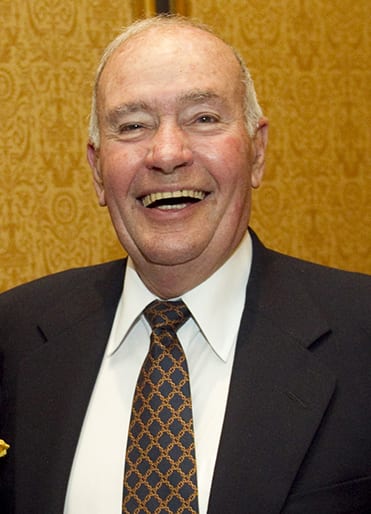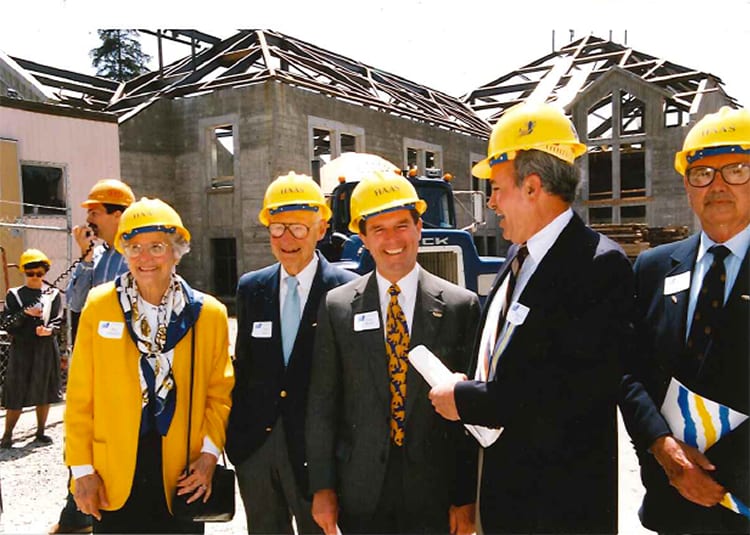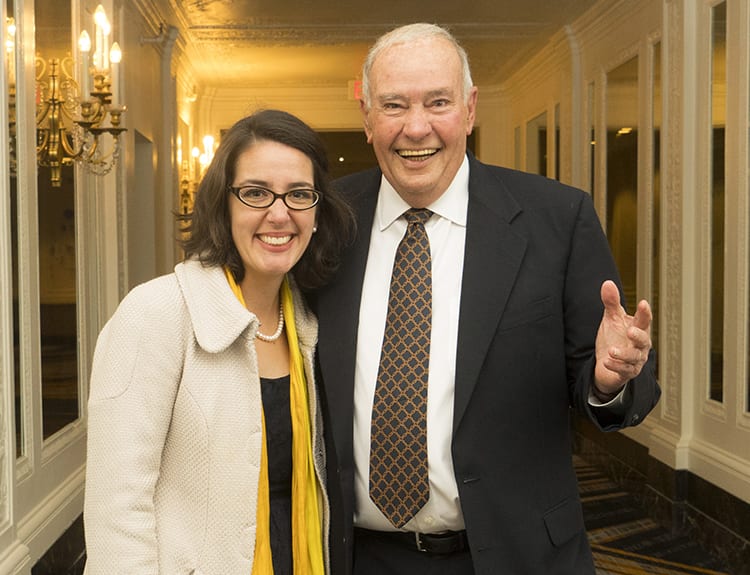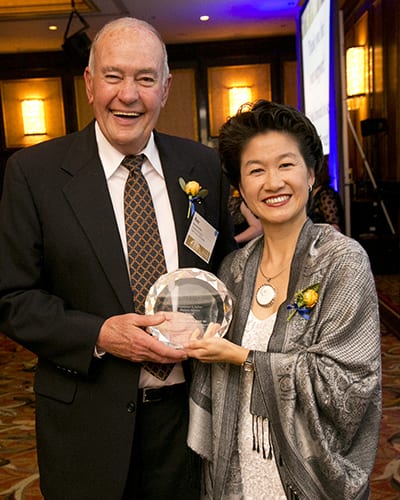Raymond Miles, a former Berkeley Haas dean and professor emeritus whose leadership has had a deep and lasting impact on the Haas campus and community, passed away on May 13 in Albany, California. He was 86.

Miles is credited with growing the school’s thriving alumni network, securing a campus that invites community, and hiring prestigious faculty members who have included two Nobel Laureates. As a scholar, he was a trailblazer in strategic management, defining human resource management styles commonly taught today.
“Ray Miles was an outstanding scholar and a visionary leader. He helped build the fields of organizational strategy and innovation at Berkeley Haas and around the world,” said Former Dean Laura Tyson, distinguished professor of the graduate school. “He represented all of the stakeholders at Haas—the students, the faculty, the alumni, and the business community, and he began the planning and fundraising process that enabled the move of the Haas School to its new complex. He dedicated his professional life to our community and we will miss him.”
Crash course in management
Born in Cleburne, Texas in 1932, Miles got a crash course in business management when he was just 22. Attending the University of North Texas (UNT), he paid for his BA in journalism by working nights for the Gulf, Colorado & Santa Fe Railroad. There, he said, he learned hard lessons about how managers should best supervise their employees—and how they shouldn’t. Those musings led to a lifetime of inquiry into strategic management, making Miles an early pioneer in thinking about how companies could align their strategies with the goals they were trying to accomplish.
After marrying Lucile Marie Dustin in 1952, and training and serving as an Air Force pilot, he earned an MBA at UNT and then a PhD at Stanford on a scholarship. Eventually, he landed in Berkeley, where he embarked upon a 50-year career in research that helped to crystalize the concept of strategic management. He put his leadership teachings into practice as dean in the 1980s.
The emergence of human resources
When Miles first arrived at Berkeley as a new professor in the Organizational Behavior and Industrial Relations group in the fall of 1963, the concept of strategic management was in its infancy. His 1965 Harvard Business Review article, “Human Relations or Human Resources?” led managers to think differently about how to utilize people in their organizations.
“Ray was one of the early contributors to the idea of human resources as a strategic function,” said James Lincoln, the Haas Mitsubishi Chair in International Business and Finance Emeritus, who worked with Miles at Berkeley’s Institute of Industrial Relations. “Instead of thinking about employees as personnel, he put forth the notion that human assets are as important as the financial and physical assets of a company and need to be managed in a strategic way. Of course everyone thinks that now, but back then, it was new.”
In the next decade, Miles studied how organizations could improve, eventually developing his breakthrough 1978 book, Organizational Strategy, Structure, and Process, written with his former student Charles Snow, PhD 72. They argued there were three distinct types of successful companies, each with its own management style: prospectors, defenders, and analyzers (and one unsuccessful type, reactors). Once a company figured out which class it belonged to, it could design its management structure and processes accordingly. Furthermore, the authors wrote, companies could change over time in response to their environments.
The book has become a classic in the management strategy field and is still regularly cited.
In later research, Miles continued to explore new concepts in the field of management strategy, creating the notion of “fit” that would help companies determine the best company strategy and how to create their structure and process accordingly. “That underlying idea of having the right strategy and structure for the market environment is still front and center of what every business school teaches in MBA courses on strategy and organizational design,” said Glenn Carroll, a former Haas professor who now teaches at Stanford.
Building campus and community

Miles proved the validity of his management strategies as dean of Haas between 1983 and 1990. His tenure started at a time of crisis for higher education, with both federal and state funding slashed. At the same time, the business school was bursting at the seams, cramped into Barrows Hall with several other departments. Berkeley’s chancellor, however, was reluctant to include a new building for the school in its capital campaign.
To manage the crisis, Miles expanded the school’s advisory board with dozens of business people who urged the school to raise money for a new building by itself. Miles commissioned former Berkeley architecture chair Charles Moore to design a new building on the site of the old campus hospital that could create community and serve as a bridge to the rest of the university. Moore’s elegant model, with interconnected buildings around a central courtyard and arches connecting it to campus, helped sway the administration. With the help of former dean Earl “Budd” Cheit, Miles secured what was then the largest gift in UC Berkeley’s history to build it.
At the same time, Miles helped grow the Cal Business Alumni Association (now known as the Berkeley Haas Alumni Network) into an active, thriving community and hired the school’s first full-time development director to increase outreach to alumni and bring the vision of a new building to fruition. By the time Miles stepped down in 1990, plans were well underway for the building, which broke ground in 1992 and opened in 1995.

During his time as dean, Miles also boosted the school’s academic potential and prestige by helping to expand the faculty. He doubled the number of endowed chairs to 24—then about a fifth of the Berkeley campus total—recruiting such luminaries as Nobel Laureate Oliver Williamson.
Miles also advanced the field of business education by supporting new programs to build on the school’s unique interdisciplinary heritage and blending of research and application, which he described as “theory-based professional practice”. The Program in Organizational Strategy focused several disciplines’ research on strategic decisions facing organizational managers. The Program in Entrepreneurship and Innovation focused on the process of developing a business plan and the broader issues of how technological and economic innovation is stimulated or stunted. And the Program in International Competitiveness focused on the need for new strategies in a rapidly changing global economy.
Miles also believed that the business school should not be an island, isolated from the community around it. In 1989, he started the Boost@BerkeleyHaas program—formerly known as the East Bay Outreach Program and then Young Entrepreneurs at Haas (YEAH)—to bring local high school students from families who traditionally hadn’t gone to college to Haas to learn about business and entrepreneurship and get comfortable on campus. The program just celebrated its 30th anniversary. It serves about 140 young people annually, and the overwhelming majority go on to college.
A “powerful people-developer”

Former Dean Rich Lyons, the William & Janet Cronk Chair in Innovative Leadership, credits Miles with having a huge influence on him and other Haas leaders.
“Ray was an important mentor to me, and a powerful people-developer more generally. You always had the sense that he had your best interest—and the school’s best interest—at heart. It’s hard to get more ‘beyond yourself’ than Ray,” Lyons said, referencing one of the school’s four Defining Leadership Principles.
Prof. Candi Yano, associate dean for academic affairs and chair of the faculty, noted that until quite recently, Miles continued to come into the office nearly every day and was continuing to publish research articles on organizational strategy and innovation. “He leaves a remarkable legacy,” she said.
In honor of the significant impact Miles has had on Berkeley Haas, the Cal Business Association created the Raymond E. Miles Alumni Service Award in 1990. This award is presented each year to an alumnus who exemplifies superior volunteer leadership.
Miles is survived by his daughter Laura (Jim), sons Grant (Patti) and Ken (Amy), brother Don (Jodi), and seven grandchildren: Justin, Michael, Nathaniel, Anthony, Sarah, Courtney and Brooke. He was predeceased by his wife Lucile in 2014.
A memorial service will be held at the Unitarian Universalist Church of Berkeley on Saturday, June 15, 2019 at 2:00 p.m.